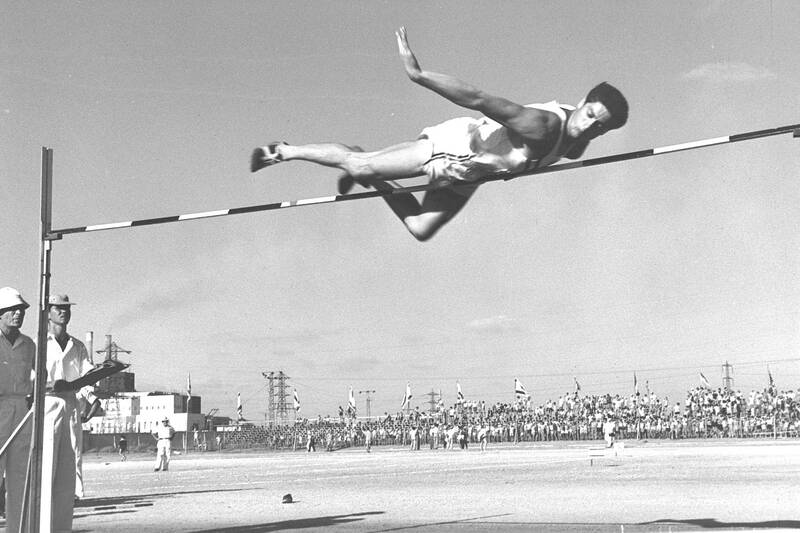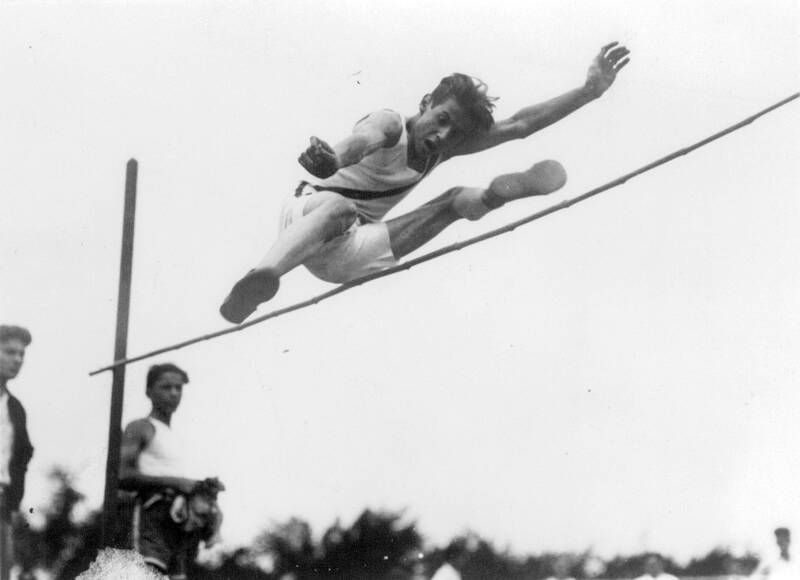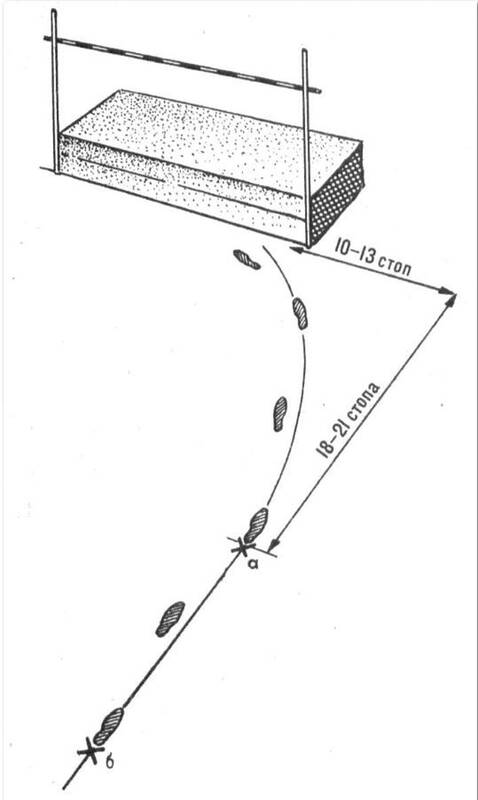Dick Fosbury, the lanky leaper who revamped the technical discipline of high jump and won an Olympic gold medal with his “Fosbury Flop,” died on Sunday last week. He was 76.
Before Fosbury, many high jumpers cleared their heights by running parallel to the bar, then using a straddle kick to leap over before landing with their faces pointed downward. At the 1968 Mexico City Olympics, Fosbury took off at an angle, leaped backward, bent himself into a “J” shape to catapult his 6-foot-4 frame over the bar, then crashed headfirst into the landing pit.
It was a convention-defying move, and with the world watching, Fosbury cleared 2.24 meters to win the gold and set an Olympic record. By the next Olympics, 28 of the 40 jumpers were using Fosbury’s technique. The Montreal Games in 1976 marked the last Olympics in which a high jumper won using a technique other than the Fosbury Flop.

Photo: AP 照片:美聯社
Over time, Fosbury’s move became about more than simply high jumping. It is often used by business leaders and university professors as a study in innovation and willingness to take chances and break the mold.
“It’s literally genius,” said 2012 Olympic high jump champion Erik Kynard Jr. “And it takes huge courage, obviously. And took huge courage at the time to even consider something so dangerous. Due to the equipment then, it was something that was a little on edge to attempt.”
Fosbury started tinkering with a new technique in the early ‘60s, as a teenager at Medford High School in Oregon. Among his discoveries was a need to move his takeoff point farther back for higher jumps, so he could change the apex of the parabola shape of his jump to clear the bar. Most traditional jumpers of that day planted a foot and took off from the same spot regardless of the height they were attempting.

Photo: Wikimedia Commons 照片:維基共享資源
“I knew I had to change my body position, and that’s what started first the revolution, and over the next two years, the evolution,” Fosbury said in a 2014 interview with The Corvallis Gazette-Times. “During my junior year, I carried on with this new technique, and each meet I continued to evolve or change, but I was improving. My results were getting better.”
The technique was the subject of scorn and ridicule in some corners. The term Fosbury Flop is credited to the Medford Mail-Tribune, which wrote the headline “Fosbury Flops Over the Bar” after one of his high school meets. The reporter wrote that Fosbury looked like a fish flopping in a boat.
(AP)

Photo: Wikimedia Commons 照片:維基共享資源
迪克.福斯貝利,這位瘦長的跳高運動員已於上週日去世,享壽76歲。他改造了跳高的技術訓練,並以其「福斯貝利跳」贏得奧運金牌。
在福斯貝利之前,許多跳高運動員採用的過竿技巧是以平行角度跑向橫竿,然後跨腿跳過去,面朝下之後著墊。在1968年墨西哥城奧運中,福斯貝利以一個角度起跳,向後一躍,將身體彎曲成「J」字形,將他6呎4吋的身軀彈射過竿,然後頭朝下墜入跳高墊。
這是個違反慣例的動作,在全世界的注視下,福斯貝利跳出了2.24公尺的成績,贏得金牌並創下奧運紀錄。到了下一屆奧運會,40名跳高選手中有28人採用了福斯貝利的技巧。1976年的蒙特婁奧運為跳高選手以福斯貝利跳以外之技巧獲勝的最後一屆奧運。

Photo: AP 照片:美聯社
漸漸地,福斯貝利的作為變得不僅僅只是跳高;它常被商業領袖和大學教授用作創新及願意冒險和打破常規的研究對象。
「這簡直就是天才」,2012年奧運跳高冠軍小艾瑞克‧凱納德說。「這顯然需要很大的勇氣。光是想到要做這危險的事都是勇氣十足。鑒於當時的設備,嘗試這樣跳有點令人提心吊膽」。
福斯貝利在60年代初開始琢磨一項新技巧,那時他還是青少年,在美國奧勒岡州梅德福唸高中。他其中一個發現是,若要跳更高,需要將起跳點向後移,這樣就可以改變他跳躍的拋物線頂點的位置來過竿。當時大多數傳統的跳高選手都會在同一個點踩地起跳,無論其試跳高度為何。

Photo: Wikimedia Commons 照片:維基共享資源
福斯貝利在2014年接受科瓦利斯報訪問時說:「我知道我必須改變身體姿勢,這開啟了革命,以及之後兩年的演變」。「我在大三時繼續使用這新技巧,每次比賽我都繼續成長或改變,但我在進步。我的成績越來越好」。
這項技術在某些地方成為輕蔑和嘲笑的對象。「福斯貝利跳」(Fosbury Flop,字面意為「福斯貝利撲騰」)一詞源自梅德福論壇郵報,該報在福斯貝利一次高中比賽後下了標題「Fosbury Flops Over the Bar」(福斯貝利撲騰過竿)。記者寫道,福斯貝利看起來就像船上一條撲騰的魚。
(台北時報林俐凱編譯)

If you’ve recently spotted adults parading around with cuddly toys dangling from their designer handbags, your eyes haven’t been deceiving you. The playful trend of adorning bags with cute charms has become popular among people of various ages. Plushies like Labubu and anime and manga characters such as Chiikawa have become must-have accessories that make personal statements. The practice of attaching charms to personal items has been common across cultures throughout history. In ancient civilizations, charms were often used as symbols of protection, good luck, or identity. Fast-forward to more modern times, and style icons like Jane Birkin, a

★ Bilingual Story is a fictionalized account. 雙語故事部分內容純屬虛構。 Kevin leaned over the bubbling pot. “Hey. . . are you okay? You’ve barely touched your food.” Zoey blinked. Her face was red — not from blushing, but from the “mala” spice and the heat of the room. Her blond hair clumped to her face like strands of fine spaghetti. Her carefully applied makeup now streaked. “This isn’t what I expected,” she said softly, forcing a smile. All around them, Kevin’s friends were laughing, shouting, and tossing ingredients into the broth. The air smelled of chili oil and garlic.

Continued from yesterday(延續自昨日) https://www.taipeitimes.com/News/lang If plushie charms are cute little nods to people’s interests, ita bags are full-on declarations. The term “ita” comes from the Japanese word itai, which means “painful” and reflects the overwhelming visual intensity of these bags. An ita bag is essentially a handbag, backpack, or tote meticulously decorated with an extensive collection of merchandise dedicated to a specific character or idol. These bags usually feature a clear plastic window to display carefully arranged pins, badges, keychains, or fan art. Both the interior and exterior may be covered in fandom memorabilia, creating an aesthetic so intense that it’s almost “painful”

對話 Dialogue 清清:華華,你知道嗎?聽說11月5號有「超級月亮」!那天的月亮會特別大、特別亮。 Qīngqing: Huáhua, nǐ zhīdào ma? Tīngshuō shíyī yuè wǔ hào yǒu “chāojí yuèliàng”! Nà tiān de yuèliàng huì tèbié dà, tèbié liàng. 華華:真的嗎?太棒了!我想去河邊看月亮,順便拍照片。 Huáhua: Zhēnde ma? Tài bàng le! Wǒ xiǎng qù hébiān kàn yuèliàng, shùnbiàn pāi zhàopiàn. 清清:聽說在超級月亮出現的那天晚上許願,願望比較容易實現。 Qīngqing: Tīngshuō zài chāojí yuèliàng chūxiàn de nàtiān wǎnshàng xǔyuàn, yuànwàng bǐjiào róngyì shíxiàn. 華華:是嗎?讓我好好想想要許什麼願。 Huáhua: Shì ma? Ràng wǒ hǎohǎo xiǎngxiǎng yào xǔ shénme yuàn. 清清:哈哈,我已經想好了,我希望「每天都準時下班」。 Qīngqing: Hāhā, wǒ yǐjīng xiǎng hǎo le, wǒ xīwàng “měitiān dōu zhǔnshí xiàbān”. 華華:嗯......我希望今年「年終獎金加倍」 Huáhua: ēn... wǒ xīwàng jīnnián “niánzhōng jiǎngjīn jiābèi”! 清清:等你把手邊的專案做完,你的願望一定可以實現的。 Qīngqing: Děng nǐ bǎ shǒubiān de zhuān’àn zuò wán, nǐ de yuànwàng yídìng kěyǐ shíxiàn de. 華華:希望一切能順利! Huáhua: Xīwàng yíqiè néng shùnlì! 翻譯